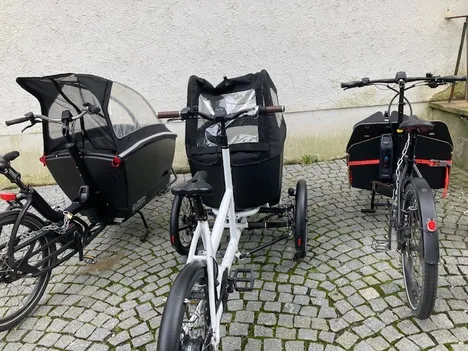SERVUS - Safe and Efficient Cargo Bikes - Construction of an E-Cargo Bike Simulator for Investigating Driving Behavior in Urban Traffic
Project Description
As part of SERVUS, a new, agile, urban cargo bike with electric drive is to be developed, which offers the user the driving characteristics of a conventional single-track e-bike with an additional stable loading area and high transport capacities. The two-part frame to be constructed for this requires the development of a new, innovative concept for the interlocking of the drive system. The requirements for this e-cargo bike are to be identified through a targeted, scientific application potential analysis. In an agile development and production process, the various possibilities of a new, suitable drive technology are to be evaluated and implemented. A total of 5 prototypes will be built. The new e-cargo bikes should be able to be used both privately and commercially. The newly developed bikes will be presented to users for the first time at events (e.g. IAA 2021) and will be rated by them.
In addition to the aim of the project to enable the prototype production of 5 innovative e-cargo bikes by autumn 2021, virtual tests will also be carried out within the project. For this purpose, an e-cargo bike simulator is set up parallel to the development and production process, which realistically mirrors the physical properties of the manufactured e-cargo bike in a virtual environment. This should make it possible to test the new e-cargo bike in simulated urban traffic in advance and to evaluate safety-critical driving maneuvers.
A physical e-cargo bike is equipped with sensors to read the steering angle (via magnetic rotary encoders), speeds (via IR sensors) and inclinations (via inertial measuring units and dynamic inclination sensors) of the executed movement via a microcontroller and send them to a simulation computer. These inputs are then mapped as a trajectory in a virtual environment. In this way, different virtual and three-dimensional traffic infrastructures and environments can be used. Test subjects can interact with the simulated road users via an interface.
Further sensors are provided for measuring the usage of the drive and the actuation of the pedals in order to measure accelerations with high precision and to enable even more precise calculation of the trajectories in the virtual space.
A virtual model of the e-cargo bike will also be developed and transmitted as an animation in the VR display. In addition, sensors are installed to observe possible test subjects during the test drives in order to draw conclusions about special behavior.
| Keywords | Electric Cargo Bicycles, VR, Bicycle Simulators |
| Funding | Bavarian Ministry of Economic Affairs, Regional Development and Energy |
| Partners | CUBE (Pending System GmbH & Co. KG) BMW AG |
| Duration | April 2021 – March 2022 |
| Contact | Lisa Kessler, Andreas Keler |
